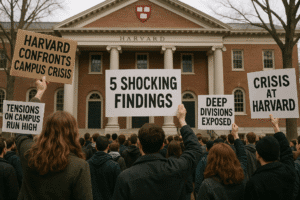Harvard Confronts Campus Crisis: 5 Shocking Findings Expose Deep Divisions and Tensions
Harvard University released twin task force reports detailing widespread hostility toward Jewish, Israeli, Muslim, Arab, and Palestinian affiliates, exposing a fractured campus climate. Surveys revealed 56% of Muslim and 26% of Jewish students felt physically unsafe, while over 90% of Muslim and 60% of Jewish respondents feared backlash for expressing views. The antisemitism report linked intolerance to politicized pro-Palestine activism and one-sided curricula, citing courses that allegedly vilified Israel. Conversely, the anti-Arab/Muslim/Palestinian report emphasized doxxing, verbal assaults, and administrative neglect, criticizing leadership changes that risked academic freedom.
Recommendations included banning protest masks, penalizing unapproved student groups, expanding Middle Eastern studies, and creating a pluralism center. While Harvard pledged some reforms—like antisemitism forums and faculty hires—critics noted uneven commitments, particularly for Palestinian support. The findings underscore academia’s struggle to balance free speech, safety, and inclusivity amid global conflicts, as students and faculty navigate fear, isolation, and ideological divides. Harvard’s response, under political and public scrutiny, may set precedents for higher education’s role in polarized times.

Harvard Confronts Campus Crisis: 5 Shocking Findings Expose Deep Divisions and Tensions
Harvard University, long seen as a beacon of academic excellence, now faces a reckoning over its campus climate. Twin task forces investigating bias against Jewish, Israeli, Muslim, Arab, and Palestinian affiliates released stark findings this week, painting a picture of a community fractured by fear, hostility, and ideological divides. The reports, totaling 500 pages, arrive as Harvard navigates intense scrutiny from lawmakers, donors, and its own community—offering both a diagnosis of systemic issues and a roadmap for change.
A Climate of Fear and Exclusion
The task forces, launched in January 2024 by President Alan Garber, revealed alarming trends through surveys and testimonies from over 2,300 affiliates:
- Physical Safety Concerns: 56% of Muslim and 26% of Jewish students reported feeling unsafe on campus, compared to 12% of Christian and 8% of non-religious students.
- Self-Censorship: Over 90% of Muslim and 60% of Jewish respondents feared academic or professional repercussions for expressing views.
- Personal Accounts: Students described social ostracization, verbal abuse, and even physical assaults tied to their identities. One Palestinian student had alcohol poured on them while wearing a keffiyeh; a Jewish student was barred from sharing a Holocaust-related speech at a conference.
Competing Narratives of Bias
The reports highlight contrasting perspectives on the roots of intolerance:
- Antisemitism & Anti-Israeli Bias: The task force linked hostility to a rise in “politicized” pro-Palestine activism and curricula perceived as one-sided. Examples included courses at the Harvard Graduate School of Education and School of Public Health that allegedly framed Israel as a colonial oppressor without historical context. Critics singled out programs like the Center for Middle Eastern Studies (CMES), accused of fostering bias.
- Anti-Arab, Anti-Muslim, Anti-Palestinian Bias: This group emphasized fears over doxxing, administrative indifference, and a lack of empathy for Palestinian suffering. Students cited incidents like doxxing trucks labeling pro-Palestine advocates as antisemitic and inconsistent punishment for protest participation. The report also warned that recent changes, such as suspending Harvard’s partnership with Birzeit University, risked stifling academic freedom.
Controversial Recommendations
The task forces proposed sweeping reforms, some already sparking debate:
- Academic Oversight: Strengthen review processes for courses and hiring, including evaluating faculty’s ability to engage diverse viewpoints.
- Protest Policies: Ban face masks at demonstrations, penalize unrecognized groups (like Harvard Out of Occupied Palestine), and standardize protest guidelines.
- Admissions & Curriculum: Assess applicants’ openness to diverse perspectives; expand offerings in Jewish, Islamic, and Palestinian studies, including new faculty hires.
- Support Systems: Provide legal aid for doxxed students and create a Center for Pluralism.
Harvard’s Response: Progress or Partiality?
While the University pledged to adopt some measures—such as hosting annual antisemitism forums and expanding Middle Eastern studies—critics note uneven commitments. For instance, the antisemitism task force secured dedicated funding and research initiatives, whereas recommendations for Palestinian academic support lacked concrete promises. Garber acknowledged institutional failures, stating, “We must address these challenges at every level,” but lingering questions remain about implementation.
The Bigger Picture
The reports underscore broader tensions in academia:
- Balancing Act: How can institutions protect free speech while ensuring inclusivity? Harvard’s struggle mirrors national debates over campus protests, hate speech, and “cancel culture.”
- Political Pressures: With federal investigations and billions in funding at stake, Harvard’s policies may set precedents for how universities respond to geopolitical conflicts.
- The Human Cost: Behind the policy jargon are students and faculty grappling with isolation and trauma. As one anonymous Palestinian student noted, “It’s exhausting to constantly justify your humanity.”
What’s Next?
The true test lies in execution. Will Harvard’s reforms foster dialogue, or deepen divisions? Can it reconcile competing demands for academic freedom and cultural sensitivity? As Garber wrote, “The scope of the challenges requires determination”—but determination must be paired with nuance to heal a fractured community.
For now, the world watches whether Harvard can model a path forward for higher education in an era of polarization—or if its efforts will be remembered as another missed lesson in leadership.
You must be logged in to post a comment.